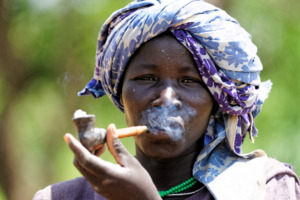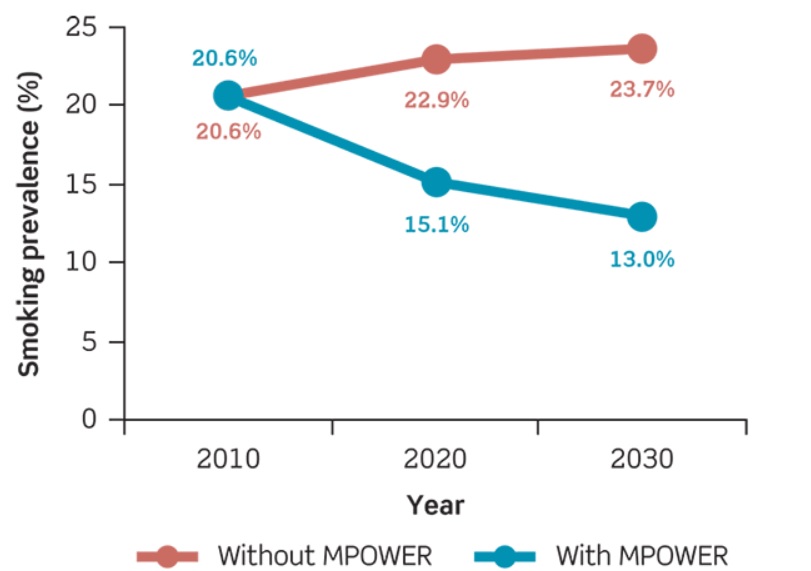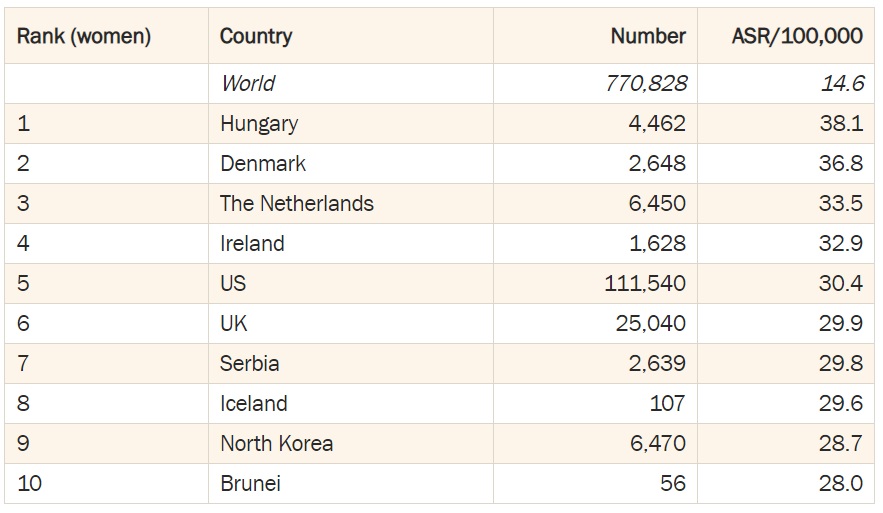Many people think that with the information bombardment and restrictions on who and where tobacco use is allowed, this is a case of “mission accomplished”. That the deadly practice has been finally contained. Yet this is at best only partly true: We see how public perceptions can be changed, affected by advertisements, easy access, and misguided leadership, each of which can diminish hard-fought campaign success.
The story of the anti-tobacco movement and the (partial) results achieved is a parable for climate activists currently trying to change our industrial production system: if nothing else, it shows that when the goal is to change a widespread modus operandi in society, the fight is inevitably uphill and never stops.
How Americans desiring access to tobacco will view the just-made decision by the US House of Representatives allowing these “leaders” to smoke in their offices – but not on the floor of Congress, will be something to follow. As a Republican Congressman recently put it, “smoking of cigars inside the Capitol is ‘about freedom’”.
This Congressional item is a way to highlight how important health-benefitting information can easily be distorted, for personal, profit, or political reasons. We have known this in other instances such as outbreaks of infectious diseases (up to the present), where science is doubted, challenged, distorted, and/or ignored for multiple reasons. Given this, it is important to look at tobacco and what we have—and where this will go if nothing is done.
Global tobacco use: A most preventable death that still kills over 8 million people every year
Broadly speaking, tobacco usage has significant health costs for most countries and are literally breathtaking. WHO notes that:
“All forms of tobacco are harmful, and there is no safe level of exposure to tobacco. Cigarette smoking is the most common form of tobacco use worldwide. Further, over 80% of the 1.3 billion tobacco users worldwide live in low- and middle-income countries, where the burden of tobacco-related illness and death is heaviest. Tobacco use contributes to poverty by diverting household spending from basic needs such as food and shelter to tobacco.”

The economic costs of tobacco use are substantial including health care costs for treating the diseases caused by tobacco use and loss of human capital. According to the World Health Organization’s 2021 report:
“Tobacco is one of the world’s largest preventable causes of premature death, accounting for more than 8 million deaths and costing the global economy US$ 1.4 trillion each year.”
New research, published in the scientific journal Plos One (July 15, 2022) examined whether smokers hospitalized for COVID-19 are at a greater risk for developing severe complications than non-smokers. The study of about 4,000 participants concluded that people who smoke or vape are 45% more likely to die from COVID-19:
WHO has actively pursued programs to provide guidance to countries since 2008. In 2015 it launched “MPOWER” (Explanation: M: Monitor tobacco use and prevention policies; P: Protect people from tobacco smoke; O: Offer help to quit smoking; W: Warn about the dangers of tobacco; E: Enforce bans on tobacco advertising, promotion and sponsorship; R: Raise taxes on tobacco).
The letters summarize the six “cost-effective and high-impact” measures, following the WHO Framework Convention on Tobacco Control (WHO FCTC) to guide countries’ tobacco policies.
To date 98 countries are now covered by at least two measures, 31 have three measures at the highest level of achievement, and five countries have four measures-obviously insufficient. For example, the Eastern Mediterranean Region is a good illustration of the impact of MPOWER measures, as compared to not using them:

Source: WHO EMRO/MPOWER index
How women became the designated victims: The tobacco industry and lung cancer in women
As early as the 1920s, tobacco advertising was targeting women and included messages such as “Reach for a Lucky instead of a sweet”, linking smoking and slimness, as a way to limit weight. This led to a more than 300% increase in U.S. sales in its first year.
Further, women ages 18 through 21 who began smoking tripled between 1911 and 1925, then tripled again by 1939. In 1968, Philip Morris marketed Virginia Slims cigarettes to women with an advertising strategy, “It’s a woman thing”, which later latched onto the women’s movement in the mid-1990s, that smoking is related to women’s freedom, emancipation, and empowerment. While these are figures for the U.S. it was similarly happening elsewhere.
The result: Lung cancer in women becomes the second most common form of cancer. In recent years, young women in particular seem more affected, with higher rates of lung cancer than men.
An additional concern is the rise of lung cancer among non-smoking women. The reasons for this latest development are still unknown, they range from genetic causes, the possible presence of radon in the home and diesel exhaust in the streets to secondhand smoke, and research is ongoing.
This said, there is no doubt at all that smoking remains the main cause of lung cancer.
Lung cancer is the second most common cancer worldwide with more than 2.2 million new cases reported in 2020. It is the most common cancer in men and the second most common in women, after breast cancer.
The stage of lung cancer, time of detection, and access to medical care determine rates of survival.
For example, in England that has a national health system, metadata shows that around 40 out of every 100 people survive their cancer for one year or more.
In short, there is no easy way to project survival rates for either men or women.
Specifically with regard to women, the statistics below are incomplete because not all countries provide data, or data the same way, and with this kind of data there are always questions of reporting accuracy.
Nevertheless the table below provides a sense of where women are highly affected. The following table show the impact of lung cancer in the 10 countries with the highest rates of lung cancer and the highest number of deaths from lung cancer in 2020:

These figures do not provide insight into another crucial concern, namely morbidity and disability: What they do tell us is that countries across the development continuum face the effects of their tobacco past- and impact on the future.
What Next? The (false?) promise of e-cigarettes, especially for teens
There are new and emerging tobacco products that will call for continuing and renewed focus especially given the growth in numbers of women users, of all ages, and the damage to their health in the years to come, as well as young people.
Vaping or electronic cigarettes has grown significantly as an alternative because of the notion that it is safer than smoking traditional cigarettes, especially among the young. And for the latter, in particular, studies have shown it can be a gateway to subsequently turn to cigarettes. In the United States, for example, E-cigarette growth has been skyrocketing among the young:
- E-cigarettes have been the most commonly used tobacco product among youth since 2014;
- In 2022, about 1 out of every 30 middle school students (3.3%) reported that they had used electronic cigarettes in the past 30 days;
- In 2022, about 1 of every 7 high school students (14.1%) reported using electronic cigarettes in the past 30 days.
Unanswered questions remain about the different chemical compounds in E-cigarettes. Apparently, some e-cigarette flavorings may be safe to eat but not to inhale, and other ingredients in e-cigarette aerosol could also be harmful to the lungs in the long term.
Richard Trumka Jr. – the son of AFL-CIO labor union leader who recently gained notoriety for triggering a war over gas stoves because of his concern over harmful indoor air pollution – investigated the e-cigarette industry’s efforts to hook teenagers on vaping when he was working for the House Oversight and Reform Committee. Following his probe, in 2020, the Food and Drug Administration banned fruit-flavored vape cartridges that appeal to teens, citing a lack of data on their potential health risks.
In short, e-cigarettes may appear as a way for cigarette smokers to abandon their habit but may be more a mirage than a cure.
This article began with U.S. Congressmen bringing back smoking in their offices. This is one example of backsliding, there are others elsewhere, signaling damaging reversals. They pose serious risks potentially anywhere, to everyone of course, but to women and teens in particular.
We know how and what needs to be done to limit tobacco risks to our health; And we can do it if we, the people and our political and business leaders have the courage and wisdom to do so…
Editor’s Note: The opinions expressed here by the authors are their own, not those of Impakter.com — In the Featured Photo: Woman exhales smoke while smoking hybrid cigarette Source: Photo by Marco Verch professional photographer, taken on October 5, 2020, cc license.
Pipe smoking woman, Eastern Equatoria (April 5, 2014) Source: www.j-pics.info










